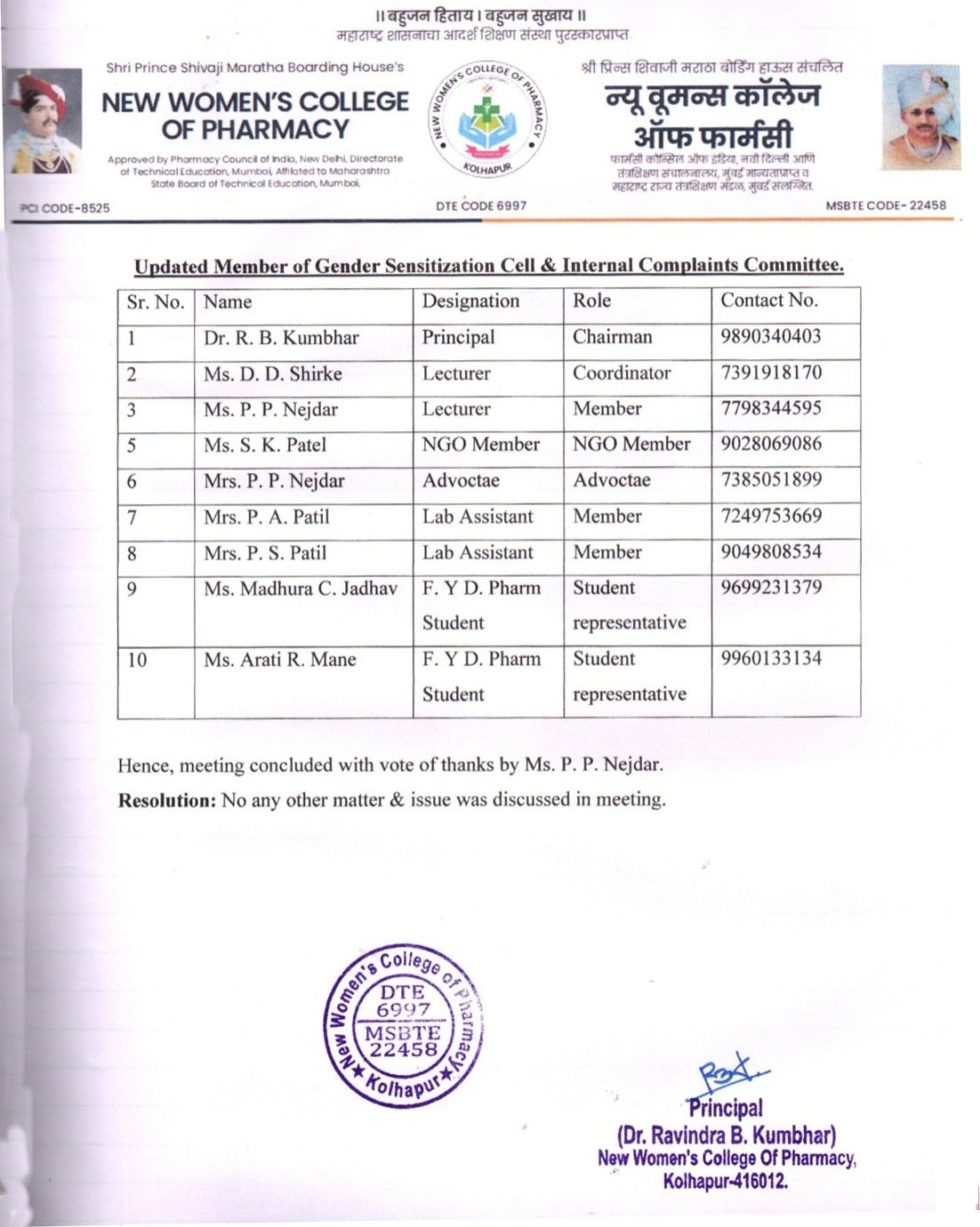Gender Sensitization & Internal Complaints Committee.

| Sr.no | Name | Designation | Role | Contact No. |
| 1 | Dr. Ravindra B. Kumbhar | Principal | Presiding officer | 9890340403 |
| 2 | Ms. Divya D. Shirke | Lecturer | Member Secretary | 7391918170 |
| 3 | Ms. Piyusha P. Nejdar | Lecturer | Member | 7798344595 |
| Police Naik | ||||
| 4 | Mr. Sujeet V. Salokhe | NGO Member | NGO Member | 9970226610 |
| 5 | Mrs Pradnya P. Nejdar | Advocate | Advocate | 7385051899 |
| 6 | Mrs. Poojashree. A. Patil | Lab Assistant | Member | 7249753669 |
| 7 | Mrs. Punam. S. Patil | Lab Assistant | Member | 9049808534 |
| 8 | Ms. Nisha S. Lot | Student | Student representative | 9359526476 |
| 5 | Ms. Siddhi B. Sutar | Student | Student representative | 9021495267 |
For the “New Women’s College of Pharmacy,” the establishment of a Gender Sensitization & Internal Complaints Committee (GSICC) is particularly crucial to ensure the safety, dignity, and well-being of female students, faculty, and staff. Here’s how the GSICC functions within the Institute:
- Formation and Structure:
- The GSICC should consist of faculty members, administrative staff, and student representatives, with a majority being women to ensure a gender-sensitive approach.
- Appoint a respected faculty member as the chairperson of the committee, responsible for coordinating its activities and ensuring compliance with policies and regulations.
- Mission and Objectives:
- Define the mission of the GSICC to promote gender sensitization, prevent sexual harassment and gender-based discrimination, and create a safe and inclusive environment for all members of the college community.
- Set objectives such as:
- Conducting awareness programs and workshops on gender issues, consent, and respectful behavior.
- Providing support and assistance to those who have experienced harassment or discrimination.
- Ensuring prompt and fair resolution of complaints through confidential and transparent procedures.
- Awareness and Training:
- Organize regular training sessions, seminars, and workshops on gender sensitization, sexual harassment prevention, and bystander intervention.
- Provide educational materials and resources to raise awareness about gender equality, women’s rights, and the college’s policies and procedures.
- Complaints Handling:
- Establish clear and confidential channels for reporting incidents of sexual harassment, gender-based discrimination, or any form of misconduct.
- Develop a procedure for handling complaints, including investigation, mediation, and resolution, while ensuring confidentiality and protection for the complainant.
- Implement appropriate disciplinary measures against perpetrators in accordance with college policies and legal requirements.
- Support Services:
- Offer support services to complainants, including access to counseling, legal advice, and medical assistance if needed.
- Ensure that measures are in place to protect complainants from victimization or retaliation and to provide them with appropriate accommodations if required.
- Policy Development:
- Review and update college policies and procedures related to gender equality, sexual harassment prevention, and complaint redressal to reflect best practices and legal requirements.
- Develop guidelines for preventing and addressing sexual harassment and discrimination in all aspects of college life, including academic, extracurricular, and residential settings.
- Awareness Campaigns:
- Organize awareness campaigns and events specifically tailored to address the needs and concerns of women students, faculty, and staff.
- Collaborate with women’s rights organizations, NGOs, and other stakeholders to amplify the message of gender sensitization and empowerment.
- Monitoring and Evaluation:
- Regularly monitor and evaluate the effectiveness of the GSICC’s activities and interventions in promoting gender equality and preventing sexual harassment.
- Collect feedback from stakeholders to identify areas for improvement and ensure that the committee’s efforts are responsive to the needs of the college community.
- Reporting and Documentation:
- Maintain accurate records of complaints, investigations, and outcomes in a secure and confidential manner, in compliance with data protection regulations.
- Prepare periodic reports summarizing the committee’s activities, trends in complaints, and recommendations for improvement, and submit them to the college administration for review and action.
- Collaboration and Advocacy:
- Collaborate with other departments, committees, and external organizations working on gender issues to leverage resources, expertise, and support.
- Advocate for gender-sensitive policies, facilities, and initiatives within the college campus and in the broader community to create a more inclusive and equitable environment for women.
By effectively implementing the functions of the Gender Sensitization & Internal Complaints Committee, the “New Women’s College of Pharmacy” can demonstrate its commitment to promoting gender equality, preventing sexual harassment, and creating a supportive and empowering environment for women students, faculty, and staff.

